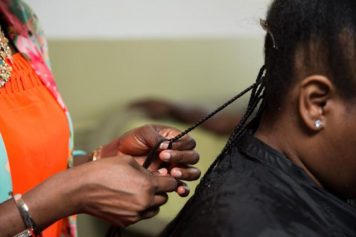
University of Central Florida student Charles Clarke. Image courtesy of the Institute of Justice.
The federal government on Tuesday is returning nearly $11,000, plus interest, to a college student who stood by helplessly as authorities at a Cincinnati airport seized a duffel bag containing his life savings in 2014, the Huffington Post reported.
Charles Clarke, a student at the University of Central Florida, was making his way through Cincinnati/Northern Kentucky International Airport in February 2014 when police stopped him and claimed a ticket official reportedly smelled marijuana coming from his bag. Authorities proceeded to ransack the bag but found no drugs. Instead, they discovered $11,000 in cash.
Clarke tried to explain that the money was his life savings that he had set aside to pay for his college tuition, but the officers didn’t believe him and accused the student of trying to smuggle drug money through the airport.
According to the Huffington Post, Clarke was arrested and charged with disorderly conduct after he protested the officers’ use of a law-enforcement tool called civil forfeiture, which essentially allows authorities to permanently seize people’s belongings and siphon the profits back into the police department. Oftentimes, they don’t need a conviction or proof of wrongdoing to strip owners of their property.
“[Civil forfeiture] allows law enforcement to seize and keep property without ever charging someone with a crime,” Institute for Justice attorney Darpana Sheth said. “Even worse, it encourages law enforcement to seize as much money and property as possible by allowing agencies to keep the proceeds for themselves.”
According to Atlanta Black Star, a report published by the Institute last year titled “Policing for Profit” showed that police departments across the nation have managed to rake in over $4.5 billion in revenue using civil forfeiture laws since 2008. Dick Carpenter, co-author of the Institute for Justice report, said civil forfeitures are just another way for departments to maintain a stream of income when budgets get tight.
While forfeiture laws were originally designed to punish notorious criminals like drug kingpins, The New Yorker reported that the average seizure in New York City and cities like it is a mere $500.
“The majority of arrests are low-level offenses, misdemeanors and below,” Runa Rajagopal, a lawyer with the Bronx Defenders, told The New York Daily News. “The majority of property taken is likely connected to a low-level charge or offense. We’re not talking yachts or luxury cars. We’re talking cash and old cars.”
Most times, victims of civil-asset forfeitures don’t get their property back or they have to jump through hoops just to reclaim what was theirs. Luckily, Clarke managed to get his cash back after a brief legal battle.
The Huffington Post reported that the Institute for Justice took the Florida student’s case pro bono in 2015. It turned out that the officers who seized his life savings at the airport that day were members of a local DEA task force. In November 2015, a judge ruled the federal government had to prove it had cause to keep Clarke’s cash, meaning it needed proof he acquired the money through drug dealing.
Both parties ultimately agreed to no longer pursue litigation and the government returned the $11,000 to Clarke, who is now finishing up his undergraduate degree. The disorderly conduct charges against him also were dropped, according to the news site.
“Charles is very pleased that he will get his life savings back and that the whole ordeal is now behind him,” Sheth said in a statement.

